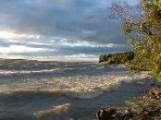Bait shop owners furious at ministry
NEWBORO -- Rodger Norris says it came "out of the blue."
The bait shop owner is slamming the Ministry of Natural Resources today, claiming it has gutted half of his business by banning the harvest of baitfish from the Great Lakes and St. Lawrence River system.
"I'm certainly not happy, that's for sure," Norris said from his business, Norris's Bait and Tackle, located between Newboro and Westport, on Tuesday.
"That's our livelihood they are playing with. É It's 50 per cent for me, but some of them, they are out."
Norris purchased his licence to take baitfish in the eastern Lake Ontario region less than five years ago.
He said he's upset because the new regulations have blindsided him as there was no consultation.
"I'm going to fight it. I'm not going down without swinging," he vowed.
Regulations announced Monday by Natural Resources Minister David Ramsay restrict commercial baitfish harvesting in any waters south of Highway 401 across Ontario, including the St. Lawrence River.
The restrictions are the first step in what a ministry spokesman told The Recorder and Times will be a comprehensive strategy to contain the spread of viral hemorrhagic septicemia (VHS).
As many as 13 species in the Great Lakes system have been affected by the deadly virus, which does not affect humans.
VHS has been linked to the mass deaths of tens of thousands of fish, including hundreds of dead muskie found floating in the St. Lawrence River in the spring of 2005.
The restrictions are largely aimed at bigger commercial harvesters in the Niagara River and Lake Erie regions who supply much of the live bait to shops across Ontario.
But Norris said they've also hit hard the many harvesters with licences for catches in eastern Lake Ontario and along the St. Lawrence River.
And Norris said the end result, in his opinion, is the baitfish restrictions will do nothing to control the spread of VHS, which he claimed hasn't even been linked to live bait.
Like other critics, he said individual anglers will continue to take baitfish from the restricted zone into inland lakes because there are simply too few MNR conservation officers to police the region.
Further, he noted the inland lakes are naturally connected to the Great Lakes and St. Lawrence.
"It's something that they haven't even looked at," he scoffed.
Serge Carriere of Ottawa is another one of those affected, but said he expects to be able to survive by relying on catches in inland lakes, particularly Lake Simcoe.
But he sympathized with those in Norris's boat, who he said have had "both legs cut out" by the ministry.
"I don't blame him at all," Carriere said of Norris's angry response.
He also joined Norris in speculating the MNR's move is simply aping a similar set of restrictions announced recently in the U.S.
"It's all the States that drove them to shut it down," said Norris.
"We've got to do what the States do," Carriere added.
Carriere supplies several bait shops in the Thousand Islands and said, in the short term at least, he doesn't forecast large price increases or supply shortages for his customers.
But as Carriere, Norris and dozens of other commercial harvesters begin to look inland for a supply of minnows, what happens to that resource?
"Two or three years and Lake Simcoe is going to be empty," said Carriere.
Inland lakes in a large swath of the province were placed in a so-called buffer zone by the MNR on Monday.
The restrictions mean baitfish can be harvested and transported within the buffer zone and to the restricted zone, but not further north.
Norris said the pressure that's about to hit those inland lakes will devastate the resource.
It's that scenario that worries Terry Nicholson who runs R&T Live Bait east of Johnstown.
"It's the only part of the business. I'm a bait dealer and that's it," said Nicholson, indicating it's supply and not cost that's his concern.
Like many bait dealers contacted in the wake of the announcement, Nicholson said the only information he had was what he'd heard through the media - there was no official word from the MNR.
"There's a lot of rumours," said Paul Rice, owner of Dad's Gone Fishing in Brockville.
Rice was still waiting to talk to his suppliers and said he didn't feel comfortable commenting on the new rules.
In Ivy Lea, David Roy, co-owner of Cast and Blast Outdoors said he is willing to give the ministry a chance to let the regulations work.
"These invasive species can do so much damage," said Roy, who did admit to being somewhat skeptical that the baitfish ban will be a magic bullet.
"On the sportfishing side I don't see it causing any big problem," he said of the restrictions, adding already a majority of anglers prefer artificial lures to live bait.



